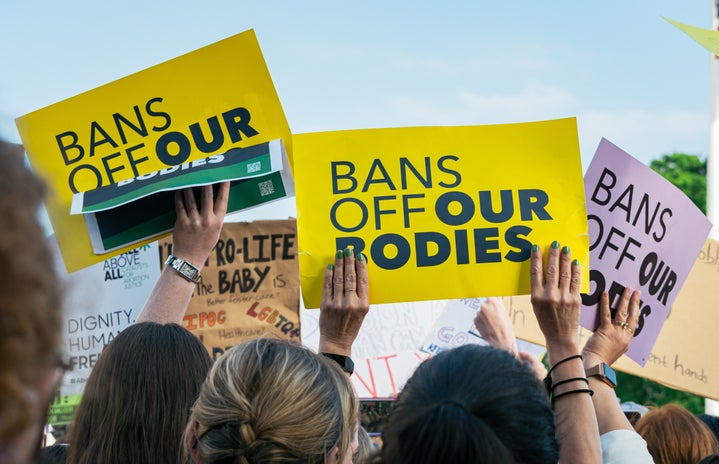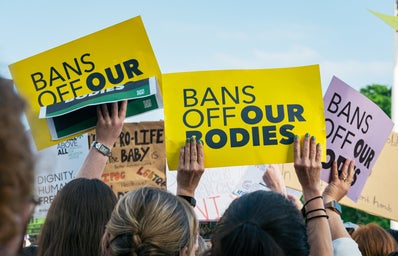The History of Roe v. Wade
On Friday, June 24th 2022, five members of the Supreme Court voted to overturn Roe v. Wade. Roe v. Wade is a nearly 50 year precedent that legalized abortion throughout the United States. This decision was made based on the Due Process Clause within the 14th Amendment, which provides a fundamental right to privacy. In the original case, seven members of the Supreme Court voted that a woman’s privacy when it comes to medical procedures falls under this amendment, making abortion a constitutional right as of 1973. This set a much-needed precedent for many other cases regarding one’s right to privacy, such as Griswold v. Connecticut, Lawrence v. Texas, and Obergefell v. Hodges. In order, these Supreme court cases legalized the right to contraception, same sex intimacy, and same sex marriage. In a concurring opinion written by Clarence Thomas after Roe v. Wade was overturned, he stated that since Roe was stricken, the Supreme Court must look at all those subsequent cases as well. The falling of Roe has allowed for most all human rights progress in the last 50 years to be reconsidered. There is much more than simply abortion that is at risk, and all of this requires that we take immediate action.
Legally protesting
As long as you are not blocking traffic or access to buildings, you do not need any form of permit in order to protest breaking news or march along streets and sidewalks. When you are lawfully present within a public space, you have the right to photograph or record anything within plain view, including police officers. Police have been shown to have a tendency to tell individuals that they are not allowed to record them, but it is within your right to do so. You also have the right to ask if you are free to go. They cannot hold you if you have not broken any laws. If they say yes, you can walk away. You also have the right to ask why exactly you were arrested. Again, if they have no cause to arrest you, you can walk away. Knowing these rights could prevent you from being detained in the first place, but there is much more to know in case of arrest.
Miranda Rights
On Thursday, June 23rd 2022, the Supreme court ruled that police officers can no longer be sued for violating your Miranda Rights. In a 6-3 decision, it was decided that police officers no longer had to read you your rights, as required by Miranda v. Arizona in 1966. However, you still have all of the rights that were decided in Miranda v. Arizona, which are the following:
- You have the right to remain silent. Anything you say can and will be used against you in a court of law.
- You have a right to an attorney. If you cannot afford an attorney, one will be appointed for you.
In order to use these rights, you must invoke them. Officers can continue to ask you questions until you specifically state that you are invoking your right to remain silent. You must also state that you are invoking your right to an attorney. The police aren’t under any obligation to provide you with an attorney until after you invoke your rights. After this, you can stay silent and wait for your attorney to arrive.
Attorney-client privilege
Attorney-client privilege is a legal privilege to keep the conversations that you have between you and your attorney private. This included all forms of confidential communication, from spoken conversation to letters. You are entitled to have a private conversation with your lawyer without the police or any sort of recording present. What you say confidentially to your lawyer cannot be used against you in a court of law. While your attorney will be aware of this, it is beneficial to know yourself.
The 4th Amendment
The right of the people to be secure in their persons, houses, papers, and effects, against unreasonable searches and seizures, shall not be violated, and no Warrants shall issue, but upon probable cause, supported by Oath or affirmation, and particularly describing the place to be searched, and the persons or things to be seized.
Essentially, the 4th amendment protects you from unlawful searches and seizures. Without probable cause or a warrant, the police may not search you or your belongings. If arrested, state that you do not consent to a search of any kind. Clarify that this includes yourself as well as your belongings, premises, or vehicles.
The 5th Amendment
No person shall be held to answer for a capital, or otherwise infamous crime, unless on a presentment or indictment of a Grand Jury, except in cases arising in the land or naval forces, or in the Militia, when in actual service in time of War or public danger; nor shall any person be subject for the same offense to be twice put in jeopardy of life or limb; nor shall be compelled in any criminal case to be a witness against himself, nor be deprived of life, liberty, or property, without due process of law; nor shall private property be taken for public use, without just compensation.
This amendment gives you the right to not incriminate yourself or be compelled by the government to provide incriminating evidence against yourself. You can invoke fifth amendment rights in court, making it so that you are not forced to be asked or answer questions by the government. This will prevent you from testifying, and cannot be used against you to obtain a guilty verdict.
The 6th amendment
In all criminal prosecutions, the accused shall enjoy the right to a speedy and public trial, by an impartial jury of the State and district wherein the crime shall have been committed, which district shall have been previously ascertained by law, and to be informed of the nature and cause of the accusation; to be confronted with the witnesses against him; to have compulsory process for obtaining witnesses in his favor, and to have the Assistance of Counsel for his defense.
The 6th amendment provides you with several rights that are involved in a criminal trial. You have the right to a public trial without unnecessary delay, the right to a lawyer, the right to an impartial jury, the right to know who your accusers are, and the right to know the nature of the charges and evidence against you. A court case cannot be seen as constitutional if all of this is not provided to you.
The 9th amendment
The enumeration in the Constitution, of certain rights, shall not be construed to deny or disparage others retained by the people.
More simply stated, any right that is not laid out explicitly in the Constitution does not belong to the federal government, but rather to the people. This also shows that the listing of certain rights does not deny the existence of other rights.
The 14th amendment
While there are five different sections to this amendment, the most important one to know in terms of arrest is the first section.
Section 1- All persons born and naturalized in the United States, and subject to the jurisdiction thereof, are citizens of the United States and of the State wherein they reside. No State shall make or enforce any law which shall abridge the privileges or immunities of citizens of the United States; nor shall any state deprive any person of life, liberty, or property, without due process of law; nor deny to any person within its jurisdiction the equal protection of the laws.
Due to this amendment, states are unable to deprive any person of “life, liberty, or property, without due process of law.” This also prevents states from denying anyone equal protection under the law. Furthermore, the 14th amendment is the one that provides us with the right to privacy, which is what the majority of human rights cases have been decided on over the last 50 years. This amendment protects you from discrimination within the government when it comes to charges and treatment and requires equal protection for all.
Why protest?
Whether or not you would personally receive an abortion, there is no denying that it is healthcare. Without this medical procedure, many individuals with uteruses will lose their lives. Many children will be born to parents that can’t take care of them. Many victims of sexual violnce will be forced through even more trauma. All in all, abortion is a lifesaving human right, and getting rid of it is the first step in reversing decades of progress. The Supreme Court will not stop with Roe, and we will continue to have fewer and fewer human rights. So fight, fight back. Don’t allow those you didn’t elect to take away a fundamental human right without a fight.
I am protesting so that, someday, I can have children and know that I did everything I could to make sure they grow up in a safe place. I am protesting for the four little girls that I nanny, who are unaware of what their government has taken from them. I am protesting so that all of the fight that was put in to create Roe v. Wade isn’t destroyed after 49 years. We all have something to lose when it comes to the overturning of Roe, so use your voice to protect your rights. You have power. Let’s make the world a place that is safe for us, safe for our kids. Stay safe, stay informed, and stay strong.


